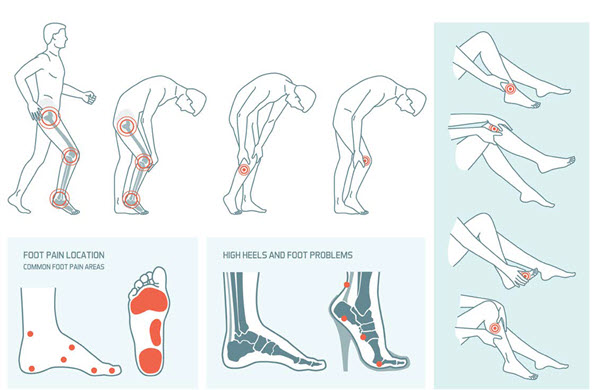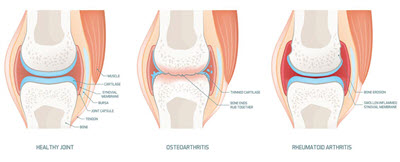Joint pain is a common problem affecting tens of millions of Americans. By some estimates, over 50 million adults in the U.S.A. have been diagnosed with some type of musculoskeletal problem like arthritis, gout, lupus, or fibromyalgia.
MUSCULOSKELETAL PAIN
Musculoskeletal pain and joint disease are often characterized by inflammation. Inflammation refers to a chain of events that occur in the body in response to injury or trauma. The inflammatory process can be acute or chronic and leads to changes in the cells, tissues, and blood vessels surrounding the inflamed area. Inflammation is associated with many other health conditions besides arthritis, such as heart disease, autoimmune disease, and inflammatory bowel disease.
INFLAMMATION
Inflammation occurs in response to acute trauma and it may also develop into a more chronic problem. The word “inflammation” comes from the Latin inflammare, meaning “to set on fire.” The cardinal signs of inflammation are redness; heat (or warmth); swelling; and pain. Acute inflammation may be characterized by joint pain & stiffness, redness, swollen joints that are painful to the touch, loss of function, and more. Inflammatory compounds may irritate the joint and wear down the cartilage. In best case scenarios, the inflammatory process leads to repair and healing. It is when the inflammatory response is abnormal, exaggerated, or prolonged that problems can occur and the inflammatory mediators can cause destruction as well as healing.
OSTEOARTHRITIS (OA)
Osteoarthritis (OA), also called degenerative joint disease, is the most common form of arthritis and occurs more in people aged 40 and up. People with OA experience deep, aching joint pain that is worse after exertion. Those with OA also complain of morning stiffness, stiffness after exercise, and aching from weather changes. Overall, they note their pain improves with rest. Osteoarthritis often results in limited movement, swollen joints, grating noises of the affected joints during motion, and X-ray evidence of narrowed joint space, bony deposits, sclerosis of subchondral space, joint deformity, and joint fusion. While OA generally demonstrates less inflammatory characteristics than the other major form of arthritis, rheumatoid arthritis (RA), OA does have some inflammatory traits: the joint capsule can become inflamed, though mildly so in comparison to RA. Also, OA is characterized by deterioration of cartilage in joints, most common in hips & knees.
RHEUMATOID ARTHRITIS
Rheumatoid arthritis is an autoimmune disease involving chronic inflammation of joints and other tissues in the body. As with other autoimmune disorders, RA occurs when the immune system mistakenly attacks the body’s own tissues. Rheumatoid arthritis affects the lining of the joints leading to swelling, pain, inflammation, and eventual joint deformity and erosion. Symptoms include joint pain, tenderness, and swelling, often worse in the mornings or after inactivity. People with this disease also struggle with fatigue, fever, and sometimes weight loss.
POSSIBLE RISKS ASSOCIATED WITH PHARMACEUTICAL NSAIDs
The conventional medical approach to treating joint pain includes a variety of interventions designed to reduce symptoms. Rest, exercise, physical therapy, medications, and surgery are all part of an allopathic treatment plan. The specific medications prescribed depend on the cause of the joint pain but may include corticosteroids (e.g. prednisone); NSAIDs (non-steroidal anti-inflammatory drugs) like aspirin, ibuprofen, naproxen; DMARDs (disease-modifying anti-rheumatic drugs) like methotrexate, sulfasalazine, and hydrochloroquine; biologic agents (biologic response modifiers) like adalimumab (Humira), etanercept (Enbrel), rituximab (Rituxan), and infliximab (Remicade). The pharmaceutical drugs mentioned above carry risks of side effects. For instance, NSAIDs are associated with bleeding in the upper gastrointestinal tract, ulcers, and heartburn. NSAIDs can also damage the kidneys. Corticosteroid use is linked with nervousness, restlessness, trouble sleeping, increased appetite, dizziness, fluid retention, increased susceptibility to infection, increased stomach acid secretion (leading to reflux or ulcers), osteoporosis, diabetes, Cushing’s syndrome, and irregular periods among other things. DMARDs carry the risk of serious side effects like liver damage, bone marrow suppression, and serious lung infections. Biologics can increase the risk of infections since they act to suppress the immune system. Many patients with arthritis are seeking alternatives to using prescription medications, or natural interventions that can be used along with their medications.

NATURAL SOLUTIONS FOR JOINT HEALTH
Nutritional Frontiers offers several options for relieving the inflammation and pain associated with arthritis such as X-Flame, Omega 3D II, HA Plus, Green Lipped Mussel, MusseLAX, and CBD Oil or Cream.
X-FLAME
X-Flame is a unique formula containing patented ingredients to reduce inflammation and modulate immune function. Select ingredients in X-Flame have been researched for their ability to decrease pain, reduce swelling, increase mobility, and minimize the need for pain medication. X-Flame contains Kre-Celazine®, DMG HCl, turmeric, boswellia serrata, ginger, quercetin, rutin, and cayenne.
Kre-Celazine® is a patented fatty acid and creatine complex. A case study and a double-blind placebo controlled trial show its efficacy in reducing inflammation, pain, swelling, and stiffness in various joints of children and teens with juvenile rheumatoid arthritis.
DMG (Dimethylglycine Hydrochloride) is an anti-oxidant and anti-inflammatory supplement that modulates cytokine production. DMG is a methyl donor, beneficial because methylation is required in many biological processes. DMG is also said to enhance athletic performance by improving oxygen utilization* and may help modulate immune and inflammatory responses in rheumatoid arthritis.
Quercitin and rutin are in the dietary flavonoid family and exhibit anti-inflammatory and anti-oxidant properties. These flavonoids also have antihistaminic activity and may help reduce symptoms associated with inflammatory conditions.
Boswellia serrata is an Ayurvedic herb found throughout western and central India. It targets inflammatory conditions like arthritis, asthma, and colitis. Boswellia does not induce the unpleasant gastric side effects associated with pharmaceutical NSAIDs. It’s theorized that Boswellia improves arthritis by improving blood supply to the joints and the preventing connective tissue breakdown.
Turmeric (Curcuma longa) is a bright yellow culinary spice that acts as an anti-oxidant as well as having potent anti-inflammatory actions as demonstrated in research. Turmeric inhibits the formation of the pro-inflammatory mediators thromboxane and prostaglandin. Additionally, it does not interfere with beneficial prostaglandin production and therefore does not harm the stomach lining. Like Boswellia, this distinguishes it from the problematic pharmaceutical NSAIDs.
Ginger root has analgesic and anti-inflammatory actions, as well as benefits for the digestive system.
Cayenne pepper is said to enhance the actions of other herbs, acting as a synergist.*
HA PLUS
HA Plus and HA Plus Vegetarian powder were formulated to assist in joint repair and increase joint comfort.* HA stands for Hyaluronic acid, which is a substance found through the body especially in synovial fluid, cartilage, skin, and the eyes. It supports connective tissue structures. HA Plus contains BioCell® Type II Collagen Matrix, which consists of collagen & hyaluronic acid in a patented delivery system utilizing low molecular weight for optimal utilization by the body.* Hyaluronic acid supplementation is thought to support synovial fluid production and restore joint comfort. This product also contains chondroitin, glucosamine sulfate, and MSM (methylsulfonylmethane) which are well known to enhance joint health and proper joint function.
Please note that HA Plus capsules contain shellfish-derived ingredients (the vegetarian power does not). As with many other Nutritional Frontiers products, though, it is free from dairy, gluten, synthetic dyes, and artificial flavoring.
HA Vegetarian powder contains similar ingredients as the capsules except its hyaluronic acid is in the form
of HyaMax™, a standardized natural hyaluronic acid. It has a mucopolysaccharide structure with glucuronic acid and N-acetyl glucosamine, which can bind 1,000 times its own weight in water for lubricating the movable parts of the human body, especially joints and muscles.* Additionally, HA Plus vegetarian powder contains Beta glucan, which can enhance immune function and manage inflammation by balancing macrophage, B lymphocyte and suppressor T cell action, plus increased nonspecific-host resistance to a variety of infections.* HA vegetarian powder also contains arabinogalactans which have been found to have strong immune-stimulating and anti-inflammatory properties.*
GREEN LIPPED MUSSEL
Green Lipped Mussel is a dietary supplement to support proper connective tissue and joint functions. Green Lipped Mussel is a Perna canaliculus (New Zealand Green-Lipped Mussel) supplement that provides key building blocks to support the structural integrity and maintenance of joints, ligaments and tendons.
Green-Lipped Mussel is rich in:
- Amino Acids (essential and non-essential) to support the growth and development of all body tissues
- Branched-chain amino acids (valine, isoleucine and leucine) used to provide energy directly to muscle tissue
- Naturally chelated minerals (for maximum bioavailability) to support the production of collagen, GAGs (Glycosaminoglycan), proteoglycans, antioxidants and enzyme activity, and to support bone and skeletal health
- Omega 3, 6 and 9 fatty acids to support joint health, immune system function and skin health, and to help regulate metabolic functions
- Naturally occurring glucosamine to support the production of GAGs and integrity of the synovial fluid
- Chondroitin Sulfates and Protein Factors that work synergistically to regulate the immune response and to neutralize the effects of destructive proteolytic enzymes
- Chondroitin Sulfates to support comfort, improve joint lubrication, elasticity and vasculature
- Hyaluronic Acid to enhance the production of proteoglycans, support synovial fluid, lubricate connective tissue cells, and function as a lubricant between the connective tissues of the skin to retain moisture
OMEGA 3D II
Omega 3D II contains a blend of non- GMO natural oils from seafood that combines the benefits of Omega 3 essential fatty acids and Vitamin D3. Nutritional Frontiers’ Omega 3D II is third-party tested for purity and boasts a 5-star rating from the International Fish Oil Standard Rating which takes into account such traits as omega-3 content, oxidation, PCB levels, and dioxin levels. Our formula contains 2.6 grams of Omega-3 plus 1,000 IU of Vitamin D3. EFAs are anti-inflammatory, promoting the release of anti-inflammatory compounds from cells. Omega 3 fatty acids in fish oil help reduce the symptoms of arthritis including reducing joint pain, morning stiffness, and NSAID medication use.
MUSSELAX
MusseLAX was designed to reduce muscle discomfort by relieving muscle spasms and promoting relaxation. This product targets symptoms of fibromyalgia and other musculoskeletal conditions associated with tight, sore muscles. Musselax contains magnesium, which has been used in a number of different medical applications to relax muscles. For example, magnesium on its own and in combination with malic acid may improve the muscle pain of patients with fibromyalgia. Magnesium plays a role in controlling muscle tone. Calcium deficiency may occur from insufficient dietary intake or vitamin D deficiency. Lack of calcium can lead to muscle spasms, especially nocturnal leg cramps. Calcium ions are relaxant to skeletal muscle, and are reduced by phosphates (such as those found in soda pop). MusseLAX also contains several ingredients to promote relaxation. Phenibut, for example, is is similar to the brain chemical GABA which is an inhibitory
neurotransmitter with utility in reducing anxiety and promoting relaxation. Chamomile has a long history of use by herbalists for reducing spasms, anxiety, tension, and inflammation. Lemon balm (Melissa officinalis) has similar relaxing properties as chamomile. Passionflower (Passiflora incarnata) has been traditionally used as a pain reliever and anxiety reducer. When combined with valerian, passionflower has been shown in research studies to help reduce symptoms of anxiety. Valerian is well known for its uses in insomnia and anxiety. Less well known is that valerian demonstrates anti-spasmodic properties.
CBD OIL AND CBD CREAM
CBD is derived from agricultural hemp, a renewable plant resource. CBD stands for ‘cannabidiol’ and refers to a portion of the hemp plant that does not contain the psychoactive substance THC, normally associated with recreational marijuana use. In other words, CBD does not produce euphoria or get you “high.” Cannabis-based medicines are gaining popularity for relief of painful conditions. Research results vary, complicated by the fact that studies use a wide range of cannabis products, doses, and delivery methods. The hemp plant, also called marijuana or Cannabis has a very long history of recorded use. For example, Chinese texts from the 3rd millennium BCE record the use of Cannabis sativa to relieve pain and cramps; ancient Indian texts from 3000 years ago note the use of bhang (ingested marijuana as food); cannabis was used for surgical anesthesia in ancient China and to relieve pain in ancient Israel, Greece, Rome, and India. When taken internally, CBD can affect how the liver metabolizes some prescription (pharmaceutical) medications taken at the same time. When adding or increasing CBD, the effect of some prescription medications can change. One can minimize this effect by starting with low doses of CBD, increasing in small steps and separating doses of CBD and prescribed medications by at least two hours. Please be sure to consult your healthcare provider and prescribing physician to best assess drug-herb interactions. CBD Cream is designed for acute joint related pain. CBD Oil systemic pain and inflammation.


 Explaining How Intestinal Bacteria May Make You Fat
Explaining How Intestinal Bacteria May Make You Fat




